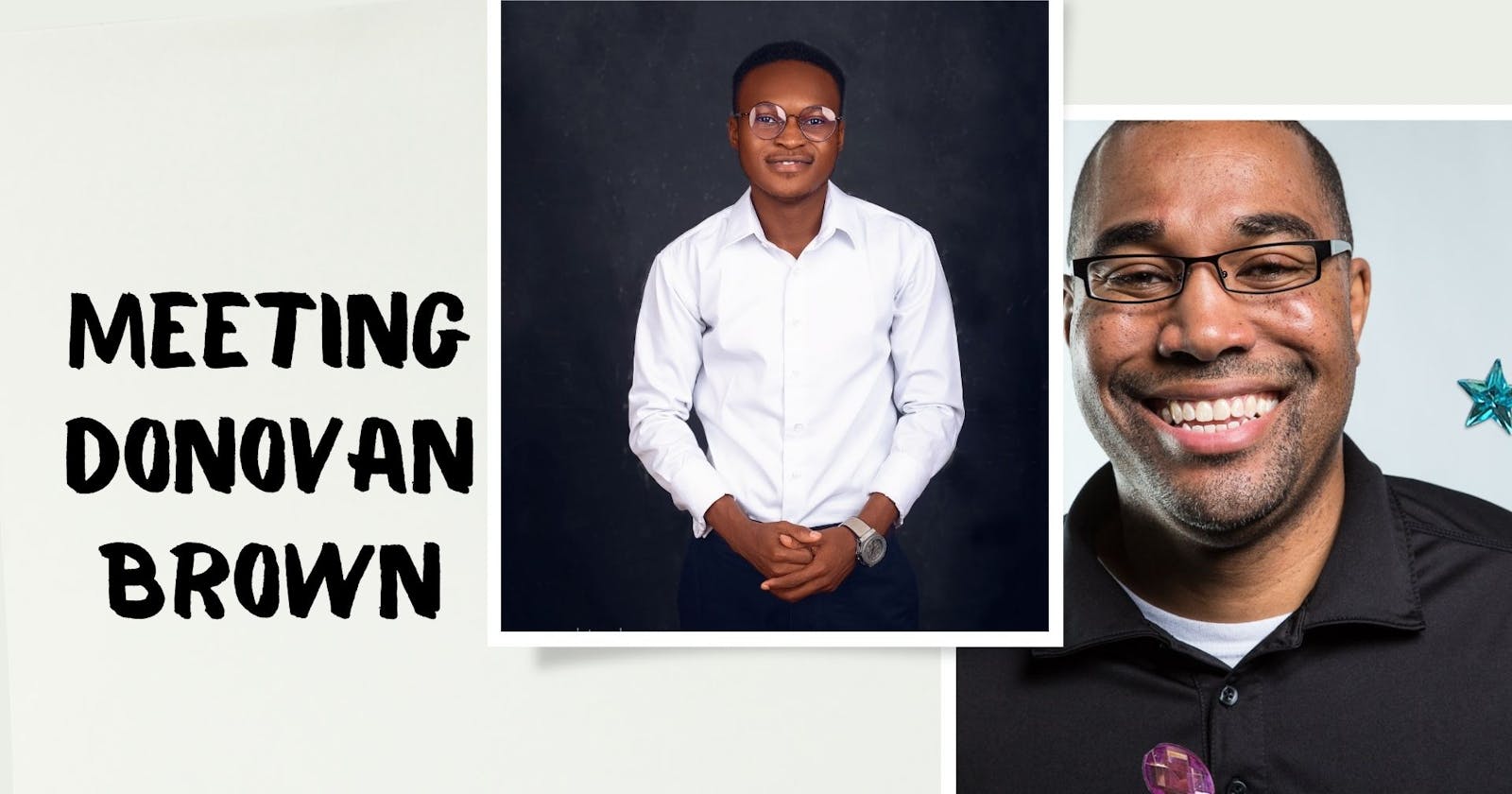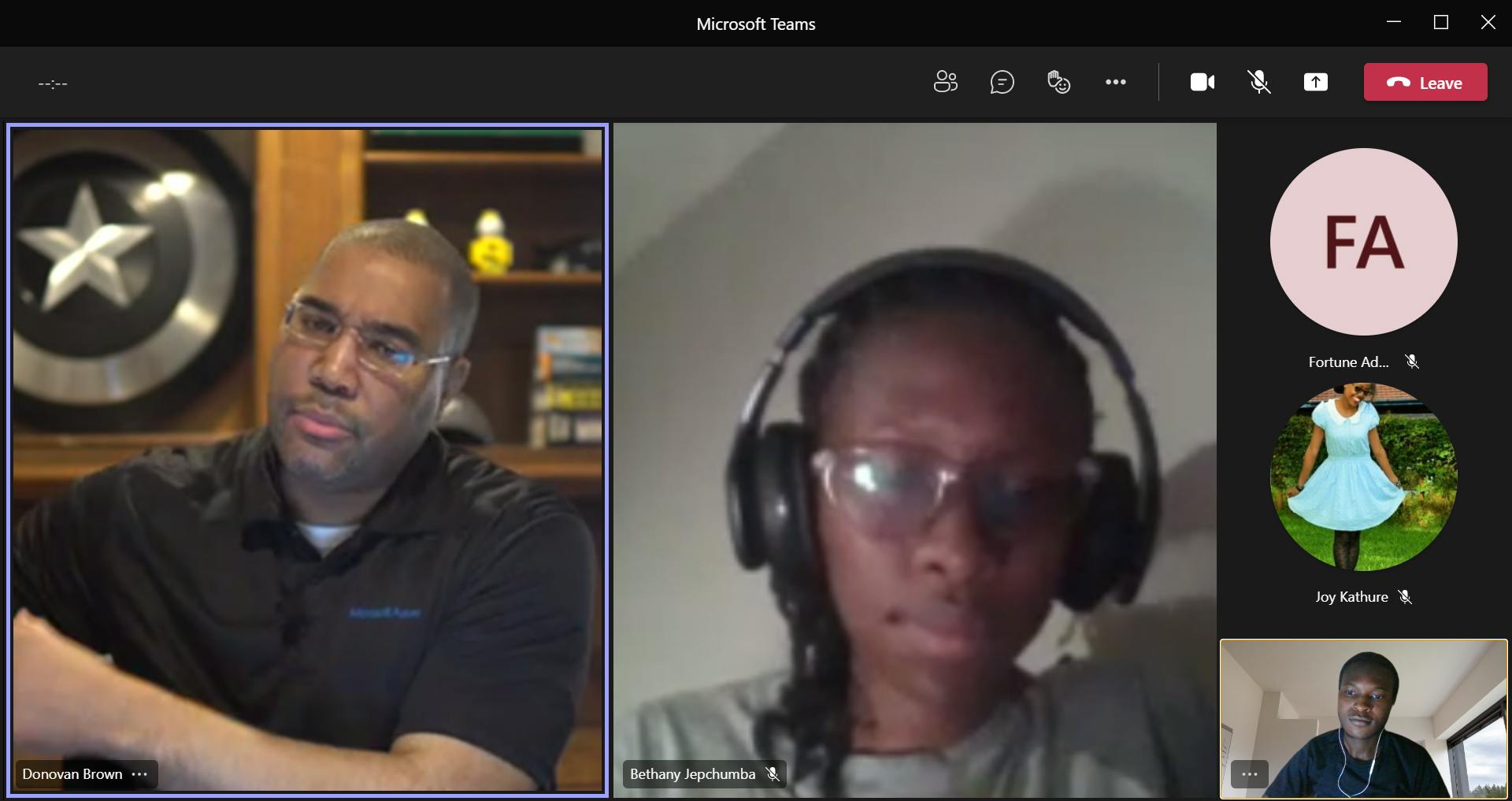Part of the reward for the winners of Microsoft ADC Game of Learners Season 2 was having mentorship sessions with Engineers at Microsoft ADC, including a mentorship session with Donovan Brown.
In this article, I’ll talk about my experience and key takeaways on having a close session with Donovan Brown, the man who defined DevOps at Microsoft. The first time I heard Donovan speak was at one of the training sessions we had during the GOL sprints where he introduced DevOps to us, the importance, and why it is needed in product building. He made an impression with the energy he gave off and the atmosphere that was created. Now, after winning, I met with Donovan. Getting to ask questions and talk with someone of his caliber, I was excited and nervous at the same time.
The First Impression.
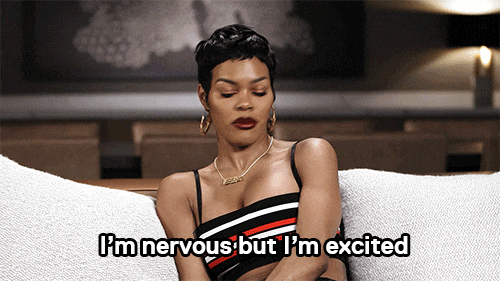
I remember joining the meetings and boom: there was Donovan right in front of me. I was super excited to see his face.
He asked us to introduce ourselves and we were waiting on one another to go first. Then he said, “Be assertive. You are in a room full of opportunities. Always go first when people are shying away.” It stuck with me because I’ve been the shy type. But from that day I decided to be assertive wherever I found myself and when communicating with people. Since it was our first meeting, we did general introductions. He told us about himself, his career at Microsoft, his hobbies, and other things he’s involved in apart from software engineering. This made him emphasize having a life outside software engineering.
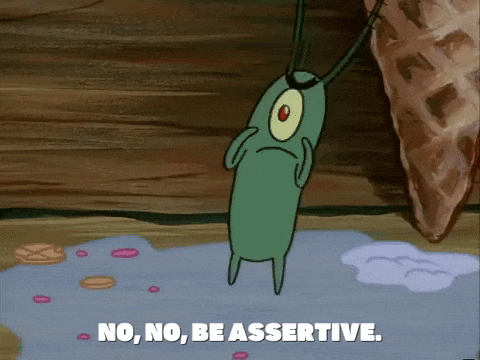
During our first meeting, I asked how I could put myself out there as a student developer learning and envisaging to be the best at what I do, as well as coping with being introverted. He said he was never the introverted type as he did a lot of things outside coding and interacted with people. On being introverted, he said “The more you do it, the less uncomfortable you’ll become”, so get comfortable with talking, going out more, and interacting outside the software engineering space.
On Work-Life Balance
Unfortunately, not many people have it. And Donovan himself said he doesn’t have it, being a borderline workaholic, but he’s working on it. At Microsoft, it is greatly encouraged to have a work-life balance but they do not lead well by example (smiles). For example, he can log on to Teams at odd hours and see his manager’s online presence check is green.
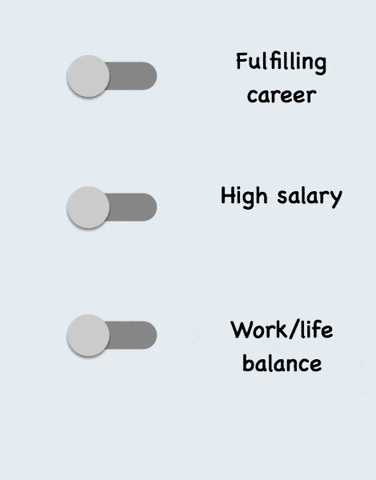
He stressed the importance of having a work-life balance and stated that as a manager, he doesn’t send emails on weekends. He writes them on Saturdays and Sundays but he doesn’t send them out until Monday. This is because whatever the engineers under you were doing when they got the mail will most likely be stopped just to attend to it, which ends up ruining their weekends. He advised that you should be sure software is really what you love to do before you make it your career. It might be a miserable job if you do not like writing software because it’s a weird job. You are fighting with the computer essentially all day.
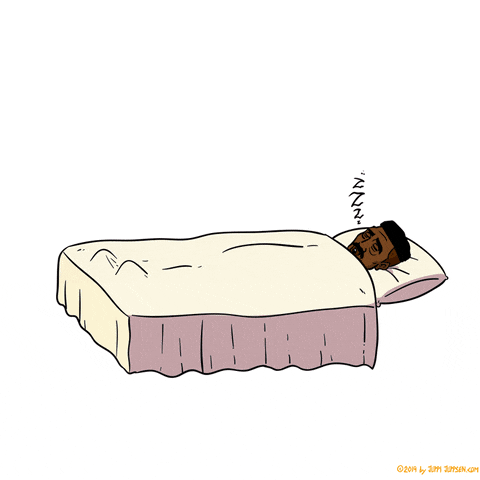
One key thing Donovan talked about on our first meeting was answering the question “What does success mean to you? When do you know you’re done? What is your picture of success?” It could be how big the house has to be, how many cars, how much money is in the bank account. How do you know what the finishing line looks like so you can track if the decisions you make drive you towards your goal or further away? When you know what success looks like, you can start to make the right decisions on how to get where you want to be in the future. If you can’t picture the end goal, what is success to you in the next five years? Not what your degree is or what your parents want you to be. Otherwise, we’d all be lawyers and doctors.
I write code for fun, I just happen to get paid for it, and writing software is one of the coolest jobs you’re going to have. - Donovan Brown
He also stressed the need to find that passion. If you’re the best in the world at whatever thing you do, you’re most likely going to make a living out of it, even if it’s writing or playing video games. What do you do on Saturday mornings when there’s no work and no disturbance? Figure out what you do for free and go figure out how to make money from it. Software is a great way to make money, but it is a measly way to only make money. If you’re doing software only because it makes money, you might not be happy doing it and it will show in your work. He wrapped up by reminding us of the assignment he gave us.
The Reunion
In our next meeting, Donovan started the session by telling us what his picture of success is and how he has been able to work towards it. This made me think about what I wanted out of life, and I came up with my picture of success. For me, this revolves around software engineering, the financial market, venture capitalism, Angel investing, giving back to the community, and helping others. After telling Donovan about my picture of success, he gave me guidelines and tips on how to go about them, such as getting better at software development, the importance of personal branding, financial markets, and investment.
Talking about Investments
Since my picture of success was similar to Donovan’s in that it had investments in it, retiring early, and living a soft life, we got talking about investments. Before our meeting, I'd been studying investment and financial markets. Donovan gave an investment masterclass on the stock market, talking about income stocks, growth stocks, dividends, real estate investment, and investing in general as opposed to saving in banks. He enjoined us to start early, as we are still young.
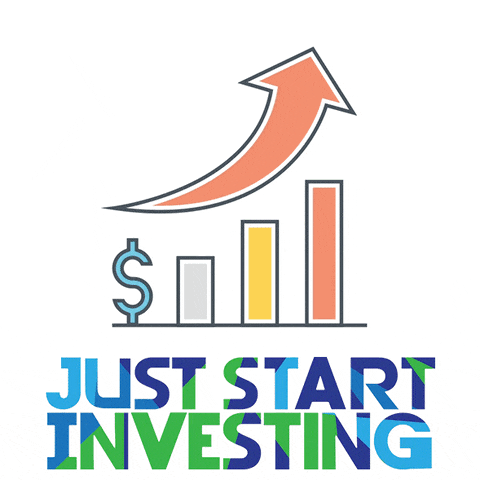 He also talked about capital gains that can be used for charity in self-directed funds which are tax-free. We also talked about quantitative and algorithm trading, which is something I’ve been quite interested in. I enjoyed this session because I wasn't expecting it to go the way that it did. At the end of the day, he gave me a dividend stock recommendation which I bought that night. And in the next meeting we had, he gave us resources on investment, like awesome book recommendations.
He also talked about capital gains that can be used for charity in self-directed funds which are tax-free. We also talked about quantitative and algorithm trading, which is something I’ve been quite interested in. I enjoyed this session because I wasn't expecting it to go the way that it did. At the end of the day, he gave me a dividend stock recommendation which I bought that night. And in the next meeting we had, he gave us resources on investment, like awesome book recommendations.
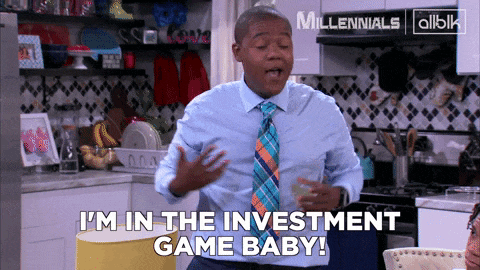
Talking about Presentations
I learned about the rigorous work and intentionality that goes into his presentations and demos. He told us about speaking and making presentations, preparing for talks. He would always say
You do not practice until you get it right, you practice until you can’t get it wrong again. When you get the opportunity, destroy it. Rehearse the words so much that you don't want to say those words again. If you stay ready you don't have to get ready. Prepare to be on stage before you get on stage. Perform the words in front of you. - Donovan Brown
He emphasized having a circle of friends or teammates that you’re constantly improving and moving forward together. He talked about Jessica Deen and how they always “compete” on giving the best talk, even investing in having the best setup for visual presentations and meetings. He talked about Scott Hanselman in his talk “The Art of speaking” coupled with the joint talk they had on .NET about speaking. He also mentioned Abel Wang (of blessed memory), and how they are all good at what they do because they put in the hours into preparation. I was amazed when he said he rehearses his presentations and demos over sixty times till he gets tired of saying the words. You should not be nervous when you get on stage and make sure no speaker wants to follow you. Stay away from the word “Uhm” and other filler words. Use silence effectively as it builds anticipation. Slow down if you say something profound, and let the audience think about it. He knows exactly how his demo’s going to go. If it fails, he knows why because he has seen it many times. Turn your nervousness into preparation and then into excitement. Pace around in the shower saying the lines to be said on stage. And when you get on stage, it’s autopilot. To practice, use user groups and small meetings where if you mess up, it’s not the end of the world. When it’s the big show, there’s no going back. That’s not the time to screw up. Be the person that shares the knowledge you get and practice, practice, practice.
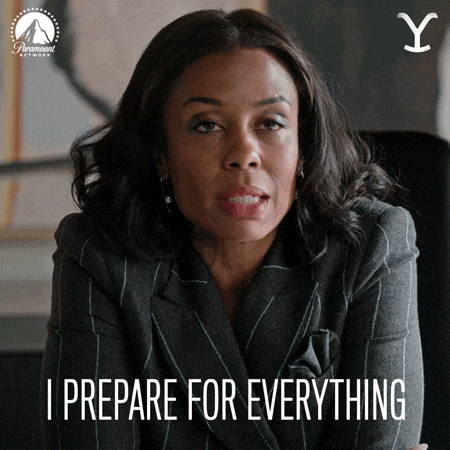
I was to have a presentation in my department in the university the following week and I put in everything Donovan talked about while preparing. It wasn’t easy but I am happy I took the baby steps to become a better speaker. Also, I will be giving a talk at the forthcoming Open-Source Community Africa Festival #OSCAFest22 in Lagos, Nigeria on Web Accessibility and Open Source and I hope to put into practice what Donovan has inculcated in me. I hope to make myself proud and make Donovan proud as well. If you are reading this and will be attending OSCAFest ’22, here’s an invite to attend my talk.
On How Donovan Learns
Donovan took us through his learning process while learning new technologies or tools. He said
I don’t blog for other people. I blog for myself and just happen to share it with others.
He creates a PowerPoint presentation sometimes while learning a new technology, to frame his thoughts on how to share the new technology he’s learning with others. He sometimes produces videos and blog posts for that, and a talk could come out of it. Just by subjecting himself to this practice, he learned more about objectives and key results which is a method of tracking your thinking progress. He blogs about his thought process, tools he struggled with, blocks he encountered, and how he solved them so people won’t be stuck going through the same process. Don’t have a blog post because you think you have to have 100,000 readers on your blog. You don’t. You might be the only reader for years, but eventually people are going to find all this amazing information you’ve been sharing. Write about things that are evergreen like concepts. Technologies change but concepts do not. Concepts are going to last forever. I learned from him that it's OK to repeat people’s content as long as you do it better: add more images, use clear diction, remove mistakes, and go build your brand. Donovan also kept tabs on us, making sure we created a Medium account to start writing as much as possible.
Finally On Personal Branding.
Another key thing I learned from Donovan is personal branding. He emphasizes so much on personal branding as a professional and as a software engineer. He said we should create a brand for ourselves such that wherever your name is mentioned, you are known for it. Also, make sure your brand is separated from the company you work for because you might leave that company anytime. If you are into software development and you write JavaScript, when he searches your name, he wants to see your blog coming up first where you write a lot about JavaScript, your YouTube channel talking about JavaScript, you tweeting a lot about JavaScript, and your optimized LinkedIn profile. And this goes for whatever you do or are interested in, be it power platform or community building. You need to be doing the job before getting the job. He also said we should get used to speaking in front of people to feel vulnerable and learn from it.

Wow!!! You made it this far. It’s been a long read, but words can hardly capture my experience. My sessions with Donovan will always be fresh in my memory and I can boldly say that it has impacted me and the way I talk. Now I look forward to every meeting with Donovan, as I am no longer nervous as I was on our first meeting. I'd love to thank my teammates for making this possible, for working together during the program, and for winning the hackathon. Also a big thank you to MicrosoftADC for putting these mentorship sessions in place. Thanks.
